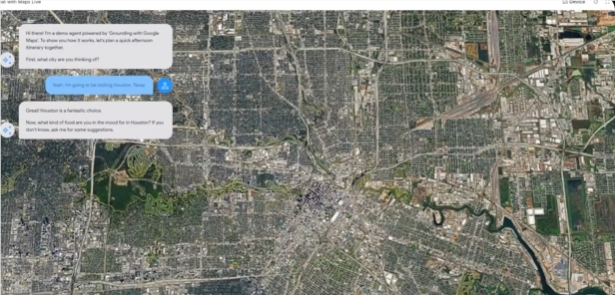Google has recently launched a new tool for the Gemini API called "Grounding with Google Maps," which deeply integrates AI reasoning capabilities with Google Maps' geographic data. This feature allows the Gemini model to directly access structured information from over 250 million locations, including addresses, operating hours, user reviews, and photos, to generate geospatial answers based on real data.
From a functional perspective, when users input queries related to locations, routes, businesses, or areas, Gemini automatically identifies the intent and uses real-time data from Google Maps to generate responses. For example, when querying "coffee shops near me suitable for remote work," the AI not only recommends stores but also provides visual map components that combine operating hours, Wi-Fi reviews, and walking routes. This approach transforms abstract text responses into actionable geographic information.
This tool supports the latest models such as Gemini 2.5 Pro, Gemini 2.5 Flash, Gemini 2.5 Flash-Lite, and Gemini 2.0 Flash. Developers can integrate this functionality by enabling the "googleMaps" tool in their API requests. It can be tested and prototyped using the Python SDK or Google AI Studio. The feature also provides context tokens, allowing interactive map components to be embedded in the response.

From a data value perspective, the 250 million location dataset accumulated by Google Maps includes historical traffic, real-time updates, and user-generated content. This integration helps Gemini address the common issue of "hallucinations" in language models—AI previously might have generated non-existent addresses or outdated information. Now, it can reason based on real data. In travel scenarios, the AI can plan complete itineraries, covering information about attractions, restaurant recommendations, and transportation routes.
Developer feedback indicates that this feature is especially suitable for multimodal interaction scenarios. Combined with voice input, users can describe their needs, such as "parks suitable for children on weekends," and Gemini can generate personalized recommendations by integrating nearby facilities, weather information, and family reviews. Test demonstrations have shown full capabilities, from street view photos to route optimization, in cities like Berlin.
In terms of application scenarios, this tool can be used across multiple vertical fields. Real estate applications can automatically generate reports on surrounding facilities, retail applications can push real-time inventory and promotional information based on location, and logistics companies can optimize delivery routes and avoid congestion. Google stated that the results are even better when used in combination with "Grounding with Google Search," as the former provides structured geographic data while the latter supplements web dynamic information, achieving the integration of maps, search, and AI.
From a technical perspective, this tool lowers the barrier for developers to build geographic data processing pipelines. Traditional solutions required developers to interface with multiple map APIs, handle data formats, and maintain updates, whereas the integrated tool encapsulates these complexities at the AI level. Industry insiders believe this will drive AI from an auxiliary tool to a decision-making system, especially in industries reliant on geographic information such as tourism, real estate, and e-commerce.
This feature is now available in over 200 countries and regions, supporting more than 36 languages. Developers can quickly get started through official documentation and the Gemini API Cookbook.
However, it should be noted that this deep data integration also raises some considerations. First, data accuracy responsibility—when AI provides recommendations based on map data, incorrect information could lead to user losses, such as misleading operating hours or routes. Second, privacy issues—although the tool uses public geographic data, combining it with user query history could create detailed location preference profiles. Additionally, this integration strengthens Google's dual advantages in geographic information and AI, potentially further consolidating its market position and putting pressure on competitors relying on third-party map services.
From a product evolution perspective, this is a strategic move by Google to integrate its core data assets (Google Maps) with AI capabilities (Gemini). By providing developers with convenient integration tools, Google aims to establish technical standards and developer dependencies in the field of location intelligence. This "data + AI" combination is a typical strategy for large technology companies to consolidate competitive advantages in the AI era.










